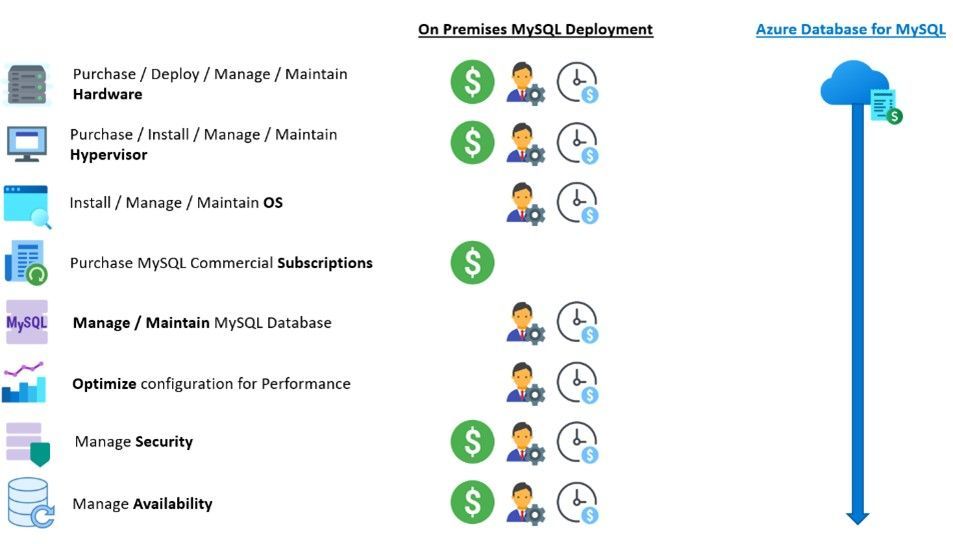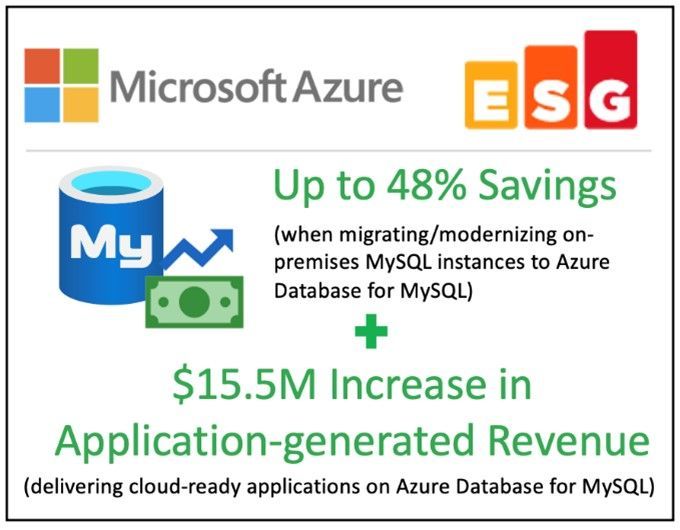This article is contributed. See the original author and article here.
Microsoft commissioned the Enterprise Strategy Group (ESG) to conduct an economic value study to examine the potential cost savings and business benefits that enterprises can achieve from migrating on-premises workloads to Azure Database for MySQL. ESG is an independent strategy firm that provides market intelligence and actionable insights to the global IT community. Aviv Kaufmann, Senior Economic Validation Analyst and author of the report, completed a quantitative economic analysis of Azure Database for MySQL and determined that customers reported savings and benefits in the three categories: 1) elimination of costs, 2) operational savings, and 3) improved business agility.
Note: The primary source for this blog is ESG’s report, The Economic Value of Migrating and Modernizing On-premises Instances to Azure (September 2, 2021).
Streamline application development on Azure
ESG conducted a survey to evaluate businesses cloud infrastructure services spending trends and found that as of January 2021, 68% of businesses planned to spend more on cloud services as we continue into the second straight year of a pandemic remote – work environment. More specifically, ESG’s survey found that 85% of cloud users have accelerated efforts to move applications to the cloud based on recent events over the last six months. Two of the top motivating factors for organizations to digitally transform their businesses are to become more operationally efficient and to embrace the ever-evolving technology trends that are allowing users to collaborate in new ways. (ESG Research Report: 2021 Technology Spending Intentions Survey, January 19, 2021)
Managed services are one of the many options that businesses are choosing to become operationally efficient. Migrating and modernizing to the cloud is a cost-effective way to streamline application development and improve business agility. MySQL is one of the most popular open source relational databases that organizations choose to power their web applications. ESG’s analysis noted that:
“While many developers have built the expertise required to deploy, manage, and maintain MySQL databases to power their applications, the burden of managing, updating, tuning, protecting, and ensuring high availability for MySQL instances across multiple applications takes valuable cycles away from development of core applications.”
ESG’s economic validation study focuses on the quantitative and qualitative benefits that organizations can expect when migrating on-premises MySQL instances to the fully managed Azure Database for MySQL service.
Azure Database for MySQL eliminates cost, provides operational savings, and improves business agility
ESG interviewed three Azure Database for MySQL customers and found that they were able to significantly eliminate costs related to hardware, infrastructure, and hypervisors, and reduce their MySQL commercial subscriptions. These customers reported that the biggest benefits they’ve seen are from the operational savings achieved by DevOps teams leveraging Azure Database for MySQL. One customer noted that, “Now that we migrated to Microsoft Azure, I don’t need to worry about all the IT operational aspects, like backups and updates, and that’s a huge benefit for my team”.

ESG found that customers were excited to report the different ways that Azure Database for MySQL helped them transform their businesses by allowing them to achieve greater business agility in everyday practice. Some of the ways that DevOps and operations teams have been able to work more efficiently include providing faster time to value, accelerating migration and modernization, improving application performance, increasing flexibility and business agility, integrating Azure Services more quickly, and increasing development velocity.
ESG’s findings
As part of their analysis, ESG leveraged customer interviews, product pricing models, and public and industry knowledge of economics and technologies to create a three-year TCO/ROI model that compares the costs and benefits of migrating on-premises MySQL instances to Azure Database for MySQL. ESG’s model found that Azure Database for MySQL provided up to a 48% lower total cost over a three-year period, including a 93% reduction in the operational cost to deploy, manage, and maintain MySQL instances in an on-premises infrastructure. ESG reports that Azure Database for MySQL offloads a bulk of the work currently performed by developers, which further reduces the cost to administer, tune, secure, protect, and maintain the MySQL databases by up to 86%. This savings equates roughly to the productivity and development capacity of four full-time developers, creating an additional $15.5 million in revenue for the business.

ESG finds that as organizations continue to migrate and modernize to the cloud, they can expect to streamline operations while reducing operational costs and improving business agility with Azure Database for MySQL. Businesses are looking to Microsoft Azure to help digitally transform their applications with more efficient microservice architectures that can be dynamically hosted, scaled, protected, secured, and delivered by the many services provided by the Azure ecosystem. ESG recommends the fully managed Azure Database for MySQL service as a cost-effective solution for successfully increasing business agility, optimizing performance, and maximizing the productivity of developers and IT resources.
For additional detail, refer to ESG’s full report, The Economic Value of Migrating and Modernizing On-premises Instances to Azure Database for MySQL.
If you’re ready to learn more, explore these resources:
- Learn more about Azure Database for MySQL.
- Read the documentation.
- Watch the on-demand webinar (available 10/1/21).
Brought to you by Dr. Ware, Microsoft Office 365 Silver Partner, Charleston SC.


Recent Comments